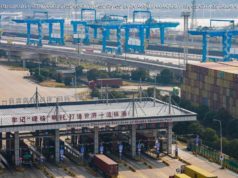Was Belt and Road Forum (BRF) summit an overall success? Yes, from the Chinese point of view because most of the key nations through which the BR projects pass through, barring India, attended.
Was Belt and Road Forum (BRF) summit an overall success? Yes, from the Chinese point of view, the BRF summit was a hit because most of the key nations through which the Belt and Road projects pass through, barring India, attended the summit at the highest level.
Thus it added substance to China’s bid to create a new world order across Asia. But the EU representatives (including those from Belgium, Estonia, Germany, Hungary, Italy and Spain) struck a jarring note by rejecting a Chinese text related to a trade prepared at the summit.
Reports
According to media reports, EU representatives explained that for Europe, the BR initiative would only succeed if it was based on transparency and co-ownership.
The EU representative had also raised the issue of profitability of the project, which remains a big question mark. This, in a way, vindicated India’s perceptions on the BR initiative.
Internally, the successful conclusion of BRF has given Chinese President Xi Jinping’s image a big boost, making him ‘the master of all he surveys’, as the cliche goes. This would further strengthen his control over the three echelons of power: the CPC, the government and People’s Liberation Army (PLA) .
But his acid test will be to successfully carry forward the project and deliver on his promises on OBOR to the people. This may not be an easy task, given the complexities of the BR initiative and the imponderables on its gruelling course.
As for India’s decision to boycott the forum, opinions are divided in the country. This is evident from editorials in national dailies, which are equally divided on the issue. There are merits and demerits in the decision taken by India.
The boycott is in keeping with the government’s policy decision, which was crystallised after China chose to ignore India’s repeated expressions of concern about the CPEC’s violation of Indian sovereignty in illegally occupied Indian territory in Kashmir. Our foreign secretary has explained India’s deep concerns explicitly to the Chinese counterparts on a number of occasions.
On the negative side, by boycotting the BRF, Prime Minister Narendra Modi lost a very good opportunity to put across the Indian perspectives and reservations on the OBOR and the CPEC at the forum attended by heads of state and high dignitaries from 29 countries.
I presume, the government took an informed decision to boycott the summit, considering the pros and cons in the entirety. I also expect the government to have worked out a post-boycott action strategy.
We will have to wait and see the developments in this regard in the coming weeks. No one can deny that the BRF has given a boost to Pakistan. The Chinese gave place of prominence to Pakistan in the summit and Prime Minister Nawaz Sharif was basking in its glory. It has come at the right time for him when his political fortunes at home have gone south rapidly.
He had been plagued by uncertainties about his future on two counts: uneasy relations with the army, which is a power centre outside the constitution in Pakistan.
Probe
The other is the judicial probe into the offshore accounts of his sons, the details of which were leaked out in the Panama Papers. It continues to haunt him. Considering this, the BRF probably worked as a shot in the arm for him, as his body language and broad smile in the visuals of the forum indicate.
But on his triumphal return home, Nawaz Sharif will be facing flak from the opposition and the media, which have been critical of the lack of transparency in the China Pakistan Economic Corridor (CPEC) project. This has gathered more mass, particularly after the Karachi newspaper Dawn published two CPEC project documents for the first time.
These indicate the great game the Chinese are playing in Pakistan. I am not sure how the Pakistan intelligentsia and politicians will react to China planning to call the shots in all walks of life in Pakistan in the next decade plus, as visualised in the project papers.
Overall, we can expect the Pakistani Prime Minister to be fully occupied with damage control measures to salvage his reputation, already in tatters. The Pakistan army will be very happy with the BRF outcome as it has been an unflinching supporter of the CPEC.
Military
As China’s powerful ally in Pakistan, the army will benefit immensely from the strategic alliance with the Chinese, not only on the military front but in internal power play as well.
It is likely to increase as the CPEC matures further in the coming days. Beefing up of infrastructure visualised under the project would add to rapid manoeuvrability of Pakistan’s armed forces in the coming years, particularly along its western borders along Iran and Afghanistan.
Of course, along our western borders, improved communication networks to be executed under the project could add form and content to the Pakistani army’s muscle-flexing in tandem with its Chinese allies. So we can expect increased belligerence from the army, hiking up provocative activities through jihadi proxies in the Kashmir Valley to tie up our forces in fighting rearguard actions.
This would add depth to safely execute the CPEC project in PoK in areas close to the border. It should also be a matter of concern for our national security planners, as the days may not be far off when the Pakistan army carries out a joint exercise with the PLA close to our western borders.
So the moot question is — are the Indian armed forces ready to face an increasingly belligerent Pakistan army, egged on by China’s elbow strength likely to increasingly figure on the nation’s security ouija board in the coming months and years.






